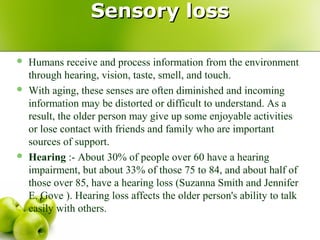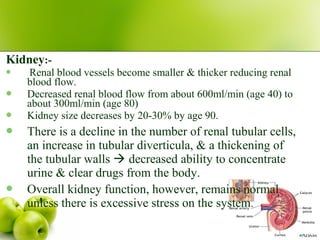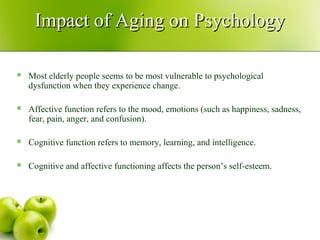Impact of ageing
- 1. Impact of ageing on Physiology, Psychology and social- emotional
- 2. AgeingAgeing Ageing is a universal phenomena and every object in the earth undergoes the process of ageing. It is a process that accumulates changes in organisms or objects over time. Human aging process involves multidimensional changes on physical, psychological, cultural and social levels. cellular and physiologic deterioration It occurs at different rates among individuals.
- 3. Impact of Aging on PhysiologyImpact of Aging on Physiology Hearing and Vision Taste and Smell Skin and hair Body Composition Nervous System Musculoskeletal System Kidney GI Cardiovascular Those changes that occur normally with the age, not due to disease. These changes include sensory loss, digestion, circulation, and sexuality
- 4. Sensory lossSensory loss Humans receive and process information from the environment through hearing, vision, taste, smell, and touch. With aging, these senses are often diminished and incoming information may be distorted or difficult to understand. As a result, the older person may give up some enjoyable activities or lose contact with friends and family who are important sources of support. Hearing :- About 30% of people over 60 have a hearing impairment, but about 33% of those 75 to 84, and about half of those over 85, have a hearing loss (Suzanna Smith and Jennifer E. Gove ). Hearing loss affects the older person's ability to talk easily with others.
- 5. Vision:- The retinas become thinner than usual in aging eyes, the sharpness that should be achieved in viewing objects at a distance is impaired, objects placed at a distance appear blurred. With aging, peripheral vision is reduced. A person may need to turn her or his head to see to the sides. The flexibility of the eye decreases and it takes an older person more time to accommodate to changes in light. Degeneration of eye muscles and clouding of the lens are associated with aging. Several changes in vision result from this. Older people tend to have trouble focusing on near objects, but eyeglasses may correct this problem. The irises get stiffened, hence, the pupils become less responsive and more sensitive to glare. The ability to see colors changes with age . Red, yellow, and orange are easier to see than blue and green. Serious vision impairments such as cataracts, glaucoma, and blindness affect between 7% and 15% of older adults.
- 6. Taste and Smell:- Some loss in taste sensitivity takes place with aging. However, the loss is minor and does not seem to occur in most people until well after 70. There is also a loss of smell, but this is not severe. Skin :- The skin serves a protective function by buffering us from the environment. Skin changes leave the older person vulnerable to discomfort and harm. Reduced sensitivity. Begins to develop wrinkles and dark spots (normally tagged as age spots also). The ability of skin to produce oils reduces resulting in dry and lusterless skin. The skin tears and breaks more easily, increasing the chance of injury and infection.
- 7. Hair :- Hair becomes thinner than normal and the changes in hair color from gray initially to turning white eventually marks aging. Decreased facial hair in men Possible chin and upper lip hair in women Nails :-decreased growth rate
- 9. Nervous system:- There is neuronal loss in the brain throughout life (the amount & location varies). Some brain regions shrink, while others remain stable as we age. Loss is chiefly gray matter not white matter Aging of the brain also impairs the ability of the brain to encode or decode new memories and facts, while processing speed and reflexes decline. Slowed neuronal transmission Changes in sleep cycle: takes longer to fall asleep, total time spent sleeping is less than their younger years, awakenings throughout the night, increase in frequency of daytime naps Sense of smell markedly decreases
- 10. Musculoskeletal SystemMusculoskeletal System Muscles:- As muscles age, they begin to shrink and lose mass. The number and size of muscle fibers also decrease. less bone mass and strength Decreased water content of tendons, the cordlike tissues that attach muscles to bones. This makes the tissues stiffer and less able to tolerate stress. Handgrip strength decreases, making it more difficult to accomplish routine activities. The heart muscle becomes less able to propel large quantities of blood quickly to the body. Tire more quickly and take longer to recover. loss of calcium from the bones. Bone demineralisation – osteoporosis. Joints:- Joint motion becomes more restricted and flexibility decreases with age because of changes in tendons and ligaments. As the cushioning cartilage begins to break down from a lifetime of use, joints become inflamed an arthritic.
- 11. Heart :-Blood vessels lose their elasticity and the fatty deposition on the artery walls makes the arteries smaller or rather narrow the space for the blood flowing through it. All these factors make the heart work harder than usual to pump the blood to other parts of the body. These changes may result in a slightly slower heart rate. A slight increase in the size of the heart, especially the left ventricle, is common. The heart wall thickens, so the amount of blood that the chamber can hold may actually decrease. The heart may fill more slowly. To compensate, elderly subjects demonstrate a doubling of percent atrial contribution to filling. The result is hypertension, cardiac arrest, arteriosclerosis and other serious disorders. Heart may be slightly less able to tolerate increased workloads.
- 12. Kidney:- Renal blood vessels become smaller & thicker reducing renal blood flow. Decreased renal blood flow from about 600ml/min (age 40) to about 300ml/min (age 80) Kidney size decreases by 20-30% by age 90. There is a decline in the number of renal tubular cells, an increase in tubular diverticula, & a thickening of the tubular walls decreased ability to concentrate urine & clear drugs from the body. Overall kidney function, however, remains normal unless there is excessive stress on the system.
- 13. Bladder:-The muscular ureters, urethra, & bladder lose tone & elasticity. The bladder may retain urine. This causes incomplete emptying. Decline in bladder capacity from about 500-600mL to about 250ml less urine can be stored in the bladder. This causes more frequent urination. The warning period between the urge and actual urination is shortened or lost as one ages.
- 14. Gastrointestinal systemGastrointestinal system Salivary glands decrease saliva production Reduces cleansing action – dry mouth (xerostomia) Dysphasia (difficulty swallowing) Taste sensation diminishes (fewer taste receptors) stomach and intestine mucosa atrophy Basal and maximal stomach acid production diminish sharply in old age. At the same time, the mucosa thins. Very little seems to happen to the small bowel constipation Decline in number of gastric cells decreased production HCL (an acidic environment is necessary for the release of vitamin B12 from food sources) Decreased production of digestive enzymes Thinner and weaker large intestine wall
- 15. Reproductive systemReproductive system Female decreased oestrogen decreased uterine size decreased secretions atrophy of vaginal lining Male decreased testosterone levels decreased sperm count decreased testicular size
- 16. The social changes that come with life are change in life style, loss of other family members, neighbors and friends. The main social problems, which confront elderly persons, are: - social isolation - finance - loneliness - rejection and loss of purpose in life. - deterioration in housing standard and poor nutritional level. Impact of Aging social-emotionsImpact of Aging social-emotions
- 17. Retirement:-A change in work role comes with retirement. It changes the way time is managed and daily activities are carried out.It alters identity, status, financial problem, lack of self- satisfaction and self-esteem and sometimes friendships. Widowhood:-A common event that alters family life for the aged is the death of a spouse. Loss of spouse is a highly stressful experience. Loneliness:- It is a subjective, negative feeling related to the person’s own experience of deficient social relations. lessen interests in hobbies/events and refused social engagements may lead isolation and leads to loneliness. Impact of Aging social-emotionsImpact of Aging social-emotions
- 18. Loss of independence:-Due to the retirement and physical disability there were loss of independence which create tremendous frustration, feelings of uselessness, sadness, fear anger and guilt. Changes in roles and relationships:- parents become grandparents adult children become caregivers for ageing parents spouses become widows or widowers Group membership roles change at: retirement moving neighbourhoods cessation of social activities due to failing health Impact of Aging social-emotionsImpact of Aging social-emotions
- 19. Loss of status and decision- making power :- Due to division of property in younger children and loss of jobs the status and decision making power decrease in family and society. Depression:-It is associated with mortality only when feelings of loneliness are present. Depression is a problem that often accompanies loneliness. Religiosity :- Fear of death/religious needs increase. Embarrassment and shame at conditions (incontinence, dependence, illness seen as weakness, etc.). Impact of Aging social-emotionsImpact of Aging social-emotions
- 20. Impact of Aging on PsychologyImpact of Aging on Psychology Most elderly people seems to be most vulnerable to psychological dysfunction when they experience change. Affective function refers to the mood, emotions (such as happiness, sadness, fear, pain, anger, and confusion). Cognitive function refers to memory, learning, and intelligence. Cognitive and affective functioning affects the person’s self-esteem.
- 21. It is influenced by the way an individual views the world and self. A positive view of self and surrounding environment promotes positive expression of mood and emotions. Self-esteem:- It is the way a person views himself/herself. A positive view of self promotes health and enables the person to cope better with the changes and challenges of growing older. Affective functioningAffective functioning
- 22. Factors contribute to a decreased in self-esteem:- Age related changes and losses that occur with aging Chronic diseases. Increased dependency . Function impairment. Lack of control over the person environment Personality:- The basic personality does not change as a result of aging process. The personality will be consistent with that of earlier years.
- 23. Depression :- Depression occurs 16-65% of elders living in the community. Depression including: sleep disturbance, lake of interest, feelings of guilt, lack of energy, decreased concentration and, loss of appetite. Losses can lead to depression.
- 24. CognitiveCognitive functioningfunctioning Intelligent, learning, attention and memory are all related to cognitive functioning and how well the mind is able to reason and make sound judgments. Intelligent:-Intelligent is a mental alertness and includes the ability to learn new material, make wise decisions, and deal with stressful situation. Intelligent does not become less with age. IQ test performance of older adults may be hindered because of sensory deficits or the stress of being tested. These factors must be considered when assessing. Memory:-Memory is defined as a recall of items learned more than a few minutes earlier or many years earlier. It is affected by age. Older people start to forget things an some part of memory in that age.
- 25. Learning :- Learning is the acquisition of new knowledge or skills. The ability of the mind to learn and retain new information remains unaltered, particularly when mind is stimulated through regular use. The ability to solve complex problems decline with age. Hearing and visual deficits related to aging process can affect learning. Attention span:- There is decrease in vigilance performance. Vigilance performance is the ability to retain attention longer than 45 minutes. The elderly is more liable to distract (divert) attention by irrelevant information and stimuli. Deficits in attention may affect learning and memory.
- 26. Thank you
Editor's Notes
- http://study.com/academy/course/foundations-of-gerontology-course.html

























